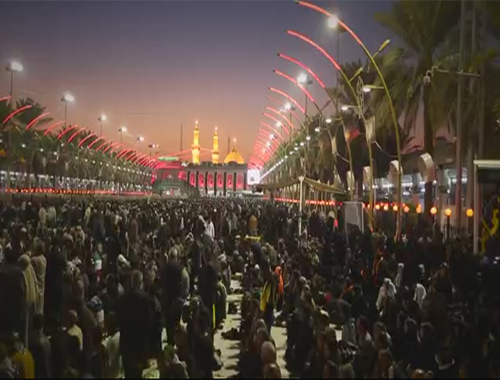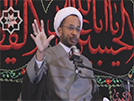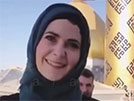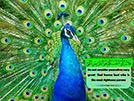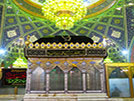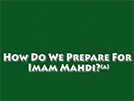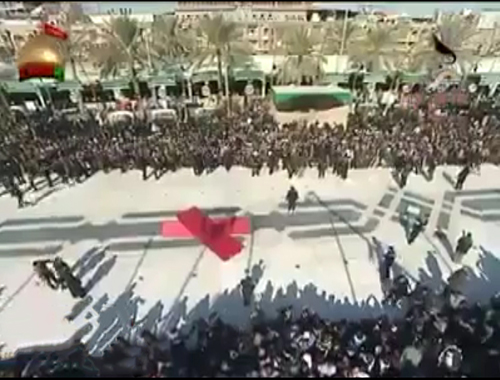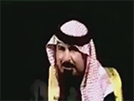Verses 1-10
- Details
- Hits: 3943
Sura Tariq
(The Night)
No.86 (Verses 1-10)
(1)وَالسَّمَاءِ وَالطَّارِقِ
(2) وَمَا أَدْرَاكَ مَا الطَّارِقُ
(3) النَّجْمُ الثَّاقِبُ
(4) إِن كُلُّ نَفْسٍ لَّمَّا عَلَيْهَا حَافِظٌ
(5) فَلْيَنظُرِ الْإِنسَانُ مِمَّ خُلِقَ
(6) خُلِقَ مِن مَّاء دَافِقٍ
(7) يَخْرُجُ مِن بَيْنِ الصُّلْبِ وَالتَّرَائِبِ
(8) إِنَّهُ عَلَى رَجْعِهِ لَقَادِرٌ
(9) يَوْمَ تُبْلَى السَّرَائِرُ
(10) فَمَا لَهُ مِن قُوَّةٍ وَلَا نَاصِرٍ
In The Name of Allah, The Beneficent. The Merciful
1. By the Sky and the Night-visitant (therein)
2. And what will explain to thee what the Night-visitant is?
3. (It is) the Star of piercing brightness,
4. There is not a soul but has a protector over it.
5. So let man contemplate on from what he is created!
6. He is created from a drop emitted.
7. Proceeding from between the backbone and the ribs:
8. Surely He is able to bring him back (to life)!
9. On the Day when hidden things will be made manifest,
10. Man will have no strength, and no helper.
Commentary:
O Man! Consider of what you are created!
This Sura like many other Suras of the last part of the Holy Qur'an, begins with some beautiful oaths to reflect upon which express a great fact.
By the Sky and the Night-visitant (therein)
* * * *
And what will explain to thee what the Night-visitant is?
* * * *
(It is) the Star of piercing brightness,
The term /tariq/ is derived from /tarq/ 'to pound'. And /tariq/ means 'way' because the path is pounded by the feet of pedestrians. The term /matraqah/ 'a sledge hammer' is used for pounding iron and materials like this.
And since the doors are closed at night when people arrive they have to pound on them to gain permission to enter, then, that which comes at night is called /Tariq/ 'the night-vistitant'.
Amir-al-Mo'mineen Ali (p.b.u.h.) said about Ash'ath-ibn-i-Qays. the hypocrite, who came to the door of his house at night and thought that he could bribe Hazrat Ali by giving him some honey paste so that he would not judge against him, then Hazrat Ali said: A stranger incident than this is that a man came to us in the night with a closed flask full of honey paste. (1)
The Qur'an has defined 'tariq', itself, where it says:
(It is) the Star of piercing brightness.
This Night-visitant is the brilliant star that appears very high in the sky as if it almost pierces its depth; and it is so bright that it splits the thick darkness and penetrates to the eyes.
There are many different ideas said about the kind of 'star' mentioned in this verse. Some of them, from the point of its distance and highness, say that it may be 'Pleiades'. Some others, from the point of its brightness, say that it is Saturn', or 'Venus', or 'a meteor'. Some ideas say that it can be any star which glitters in the sky. But, taking note that the modifier 'piercing' mentioned in the verse for the star, shows that the star is not any star, but it is a forceful bright star whose light passes through the darkness of night and penetrates to men's eyes.
Some narrations denote that the 'star' is 'Saturn' which is one of the planets of the solar system and is very bright.
This very idea is also understood from a narration of Imam Sadiq (p.b.u.h.) when he was asked by an astronomer regarding what Allah meant by /thaqib/ in that verse and he answered:
It is 'Saturn' which appears in the seventh sky. But its light passes the skies and reaches the first sky. That is why Allah has called it 'the star of piercing brightness'. (2)
It is noteworthy that Saturn is the last and the farthest star to us in the solar system which is visible simply by the naked eye. And from among the planets of the solar system, it is the sixth in distance from the sun, but if we count the moon's circle, it will be the seventh; so Imam Sadiq (p.b.u.h.) has considered its circle as the seventh sky in the mentioned narration.
Having some outstanding characteristics, Saturn deserves to be sworn to. It is the farthest visible star in the solar system and everything which is very high is exemplified in Arabic literature.
Saturn is notable for several concentric bright rings, which revolve around it in the plane of its equator, and are the most amazing celestial phenomena about which meteorologists have delivered various ideas. But, there are still more secrets about it that must be discovered in the future.
Some experts believe that there are ten moons around Saturn eight of which can be seen through ordinary telescopes, but, two of them can only be seen by very great and powerful telescopes.
It is clear that when the Holy Qur'an was revealed no one knew all of these facts and it is after many centuries that we know them now.
Moreover, the commentary of 'the star of piercing brightness' may cover any bright star, and Saturn, being one of its examples, does not contradict the above idea.
'Piercing star' is one of the wonders of the celestial creations and may be one of the examples of the above mentioned commentary. As in Sura Saffat, No. 37, verse 10 which says: Except such as snatch away something by stealth, and they are pursued by a flaming fire, of piercing brightness.
The occasion of revelation recorded in some commentaries for the above mentioned verse, attests to this idea.
* * * *
Now let us see what these oaths are for. In the next verse it says:
There is not a soul but has a protector over it.
This protector is for recording one's acts and retaining them for the Reckoning Day.
It is similar to what Sura lnfitar, No. 82, verses 10-12 carry over. They say: And surely there are Watchers over you , Honourable scribes: They know (and understand) whatever you do.
Thus, you are not alone. Whoever you are, and wherever you are the angels of Allah watch you. This is a subject that can be very useful in training and improving Man, if he will only consider it.
It is noteworthy that the 'protectors' are not defined in the verse as to who they are, and what kind of things they protect, but some other verses of the Qur'an clearly certify that they are angels and the things that they protect are 'Man's deeds'; irrespective of good or evil.
Some probabilities denote that this protection is the protection of humans from accidents and fatal events. Verily, if Allah did not protect them, there would be few people who would die of natural causes, because the number of terrible accidents is so large that no one can escape from them, particularly young children.
Or, the protection may be the protection of humans against the whispers of Satans, of Jinns and of men. They are so many that if Allah did not protect them, no one would remain safe.
But the first commentary seems the most suitable, because the latter verses talk about Resurrection and Reckoning, though all three commentaries, together, do not seem improbable.
It is praiseworthy that the aforementioned oaths have a close relationship with the protection of angels from the deeds of Man; that which the oaths are for. Since, the stars, rotating in a regular order high in the sky, are as an evidence for the existence of a definite regularity in the universe, then how can Man's deeds be left alone without a reckoning and protection from the divine protectors?
* * * *
Then, to prove the possibility of the Resurrection for those who consider it impossible, it says:
So let man contemplate on from what he is created!
And, thus, the Qur'an asks and advises all Mankind to think about that which they were created from in the beginning.
* * * *
But, immediatetly after that the Qur'an answers the question, itself, and says:
He is created from a drop emitted,
A gushing fluid in which his life-germ was floating.
* * * *
And in another description for 'that water pouring forth' it says:
Proceeding from between the backbone and the ribs.
There are many different ideas for the commentary of the terms /sulb/ 'backbone' and /tara'ib/ 'ribs', as mentioned in this verse, where the fluid comes forth from between them. In these ideas the commentators mostly try to comment on these two terms referring to man and woman from which the egg and sperm form the foetus.
But, primarily it should be noted that the verse is speaking only about a man's fluid, because 'a drop emitted' belongs to a man not to a woman since that of a woman does not emit and it says that the gushing fluid is so that: Proceeding from between the backbone and the ribs.
Then, it is not appropriate to bring woman into this discussion. It is better to say that the Qur'an points to one of the two main parts of the life-germ, viz: a man's seed, which is understandable to all; (see also Sura Naim, No.53, Verse 46 and Sura Qiyamat, No, 75, verse 37). And 'backbone' and 'ribs' are a man's back and front; the area between which his fluid comes from.
This is a clear commentary and the meanings of the terms simply conform to what is found in a dictionary. Meanwhile, there may be greater facts hidden in the verse that modern science has not found yet, however, scientists may uncover them in the future.
* * * *
Then, as a consequence it says that the Creator who created Man from a sperm drop:
Surely He is able to bring him back (to life)..
At first it was dust. Then, after some changes, it varied to a sperm drop, and eventually it turned into Man, after passing some amazing and complicated stages, of course. So, it will not be difficult for Allah to bring him back to life again.
This fact is similarly mentioned in some other verses of the Qur'an such as in Sura Hajj, No. 22, verse 5 which says: O mankind! if you have a doubt about the Resurrection (consider) that We created you out of dust, then out of sperm...
And also in Sura Maryam, No.19, verse 67 which says: Does not man call to mind that We created him before, when he was nothing?
* * * *
In the next verse it describes the Great Day when it says:
On the Day when hidden things will be made manifesL
The term /tubla/ is based on /balava/ 'to prove by trial or examination ' and since the facts will be made manifest upon examination then the term is used, here, in the sense of 'appearing'.
The term /sara'ir/ is the plural form of /sarirah/ 'a secret; or inner thought, case, mood'.
Yes, on that Day, the day of appearing and the day of sorting out, the secrets will be uncovered and everything from good or evil, truth or falsehood, pure or impure will become quite evident. The believing people will be proud, then, and will be honoured by additional rewards, but the unbelieving ones will be ashamed and blamed because of this clear manifestation.
What a painful time he will have who lived a life respectfully, but with hidden evils; then, everything will become obvious to all! Surely he will be completely sorry and regretful on that Day. This may be more painful for him than the flames of fire in Hell.
Sura Rahman, No. 55, verse 41 also says: For the sinners will be known by their Marks.... In some other verses of the Qur'an we read that in the Hereafter there are some people whose faces are white and bright, but there are others that have dark and dusty faces (Sura 'Abasa, No. 80, verses 38-41).
Verily, similar to the Night-visitant and other stars that appear at night and everyone can see them in the sky, the protectors of Man, who record and keep his deeds, will unveil everything there, also.
It is narrated from Ma'ath - ibn - Jabal who asked the Prophet (p.b.u.h.) about the interpretation of the term /sara 'ir/ 'secrets', in this verse regarding what secrets there are by which Allah will examine the people in the Hereafter and he answered: Your secrets are your deeds such as prayers, fasting, religious tax, ablution, wet dream ceremonial bath, and any other obligatory acts. All of them are hidden, because if a person wills he says he has said his prayers but in fact he has not, he says he has made his ablution, but he has not, and this is the commentary of which Allah says: 'On the Day when hidden things will be made manifest'. (3)
* * * *
But, the great difficulty is that, on that Day:
Man will have no strength and no helper.
He will have no power to hide his evils, and no one to help him to ward off Allah's punishment.
Many verses of the Qur'an denote that, on the Day of Judgement, Man will have no helper, no use of ransom, no way of returning and no chance of fleeing. The only useful means to make one safe from torments will be pure belief and good deeds.
(1) Nahj-uI-Balaqa, Sermon 224 (Arabic Version). Sermon 228 (English Version).
(2) NUr-uth-Thaqalayn, vol.5, p.550, Tradition 4.
(3) Majma'-al-Bayan, vol. 10, p. 472; and a similar meaning is found in Durr-al-Manthur, vol. 6, p.336.

